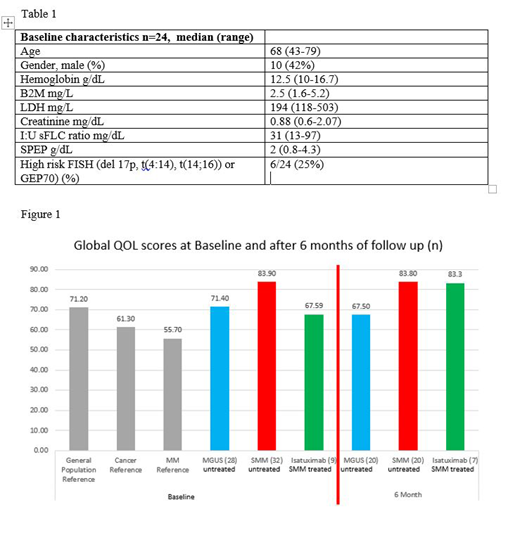Background High risk smoldering multiple myeloma (HRSMM), defined as having immunoparesis and at least 95% abnormal plasma cells/all plasma cells by advanced flow cytometry, has a risk of progression to multiple myeloma of about 75% after 5 years of diagnosis. These patient have no symptoms and current standard is to follow them without treatment. Isatuximab is an IgG1 monoclonal antibody that binds to CD38 highly expressed in myeloma cells. Isatuximab has activity as monotherapy (overall response rate (ORR) 35%), with lenalidomide/dexamethasone (ORR 56%) and pomalidomide/dexamethasone (ORR 62%) in relapsed MM. We designed a phase II study to test the efficacy of isatuximab in high risk smoldering myeloma. Our study is registered in clinicaltrials.gov as NCT02960555.
Methods The primary endpoint of the study is the ORR of isatuximab 20 mg/kg IV days 1, 8, 15, 22 cycle 1; days 1, 15 cycles 2-6 and day 1 cycles 7-30 in high risk smoldering myeloma. 24 patients were accrued in the first stage (of maximum 61 patients). Secondary endpoints are PFS, OS, clinical benefit rate (CBR). Exploratory endpoints are quality of life analysis (QoL), MRD, molecular/immune characterization using DNA/RNA sequencing of myeloma cells and the microenvironment before and after treatment.
Results 24 patients with HRSMM were accrued from 02/08/2017 until 12/21/2018 (Table 1). All patients are evaluable for response. Best responses: ORR (≥PR) 15(62.5%), CR MRD- flow at 10-5 1 (5%), VGPR 4 (17%), PR 10 (42%), minor response (MR) 4 (18%), stable disease 5 (21%); CBR (≥MR) 79%. Median number of cycles received were 11.5 (range 6-30). Five patients have stopped treatment (one has completed the study, one with heavy history of smoking was diagnosed with squamous cell cancer of the tongue, one could no longer travel to treatments due to relocation, two progressed to active multiple myeloma after 16 and 6 cycles of treatment, respectively). There have been no deaths. DNA/RNA seq is ongoing for biomarkers of response. There were 5 grade 3 severe treatment-related adverse events (RAE) which resolved to baseline: dyspnea -related to infusion reaction (n=2), headache (n=1), ANC decrease (n=1), urinary tract infection (n=1). Most common grade 1-2 related adverse events (n): nausea (7), vomit (5), WBC decrease (3), diarrhea (3), fatigue (6), headache (4), mucositis (4), myalgia (4) and infusion reaction (3). In patients with available QoL functional scores (n=9 at baseline and n=7 after 6 months of therapy), isatuximab was effective in reducing their anxiety and worry of progression to multiple myeloma. Isatuximab also improved general QoL scores by the end of cycle 6 of treatment which were now comparable to those in the general population (Figure 1).
Conclusion Isatuximab is very well tolerated, results in high response rates in HRSMM and has the potential to change the natural history of this disease. In ongoing QoL analysis, initial data shows improvement in QoL and decreased cancer worry after isatuximab treatment. Immune-genomic analysis is ongoing and may identify patients that benefit the most from treatment.
Manasanch:celgene: Honoraria; merck: Research Funding; quest diagnostics: Research Funding; sanofi: Research Funding; BMS: Honoraria; Sanofi: Honoraria. Jagannath:Multiple Myeloma Research Foundation: Speakers Bureau; BMS: Consultancy; Celgene: Consultancy; Novartis: Consultancy; Medicom: Speakers Bureau; Merck: Consultancy. Lee:Daiichi Sankyo: Research Funding; Celgene: Consultancy, Research Funding; GlaxoSmithKline plc: Research Funding; Sanofi: Consultancy; Takeda: Consultancy, Research Funding; Amgen: Consultancy, Research Funding; Janssen: Consultancy, Research Funding. Patel:Poseida Therapeutics, Cellectis, Abbvie: Research Funding; Oncopeptides, Nektar, Precision Biosciences, BMS: Consultancy; Takeda, Celgene, Janssen: Consultancy, Research Funding. Kaufman:Janssen: Other: travel/lodging, Research Funding. Thomas:Xencor: Research Funding; BMS: Research Funding; Celgene: Research Funding; Amgen: Research Funding. Mailankody:Takeda Oncology: Research Funding; Juno: Research Funding; Celgene: Research Funding; Janssen: Research Funding; CME activity by Physician Education Resource: Honoraria. Lendvai:Janssen: Employment. Neelapu:Acerta: Research Funding; Celgene: Consultancy, Research Funding; BMS: Research Funding; Kite, a Gilead Company: Consultancy, Research Funding; Incyte: Consultancy; Merck: Consultancy, Research Funding; Allogene: Consultancy; Cellectis: Research Funding; Poseida: Research Funding; Karus: Research Funding; Pfizer: Consultancy; Unum Therapeutics: Consultancy, Research Funding; Novartis: Consultancy; Precision Biosciences: Consultancy; Cell Medica: Consultancy. Orlowski:Poseida Therapeutics, Inc.: Research Funding. Landgren:Sanofi: Membership on an entity's Board of Directors or advisory committees; Karyopharm: Membership on an entity's Board of Directors or advisory committees; Adaptive: Honoraria, Membership on an entity's Board of Directors or advisory committees; Amgen: Honoraria, Membership on an entity's Board of Directors or advisory committees, Research Funding; Celgene: Honoraria, Membership on an entity's Board of Directors or advisory committees, Research Funding; Janssen: Honoraria, Membership on an entity's Board of Directors or advisory committees, Research Funding; Takeda: Honoraria, Membership on an entity's Board of Directors or advisory committees, Research Funding; Theradex: Other: IDMC; Abbvie: Membership on an entity's Board of Directors or advisory committees; Merck: Other: IDMC.
Isatuximab for the treatment of smoldering myeloma
Author notes
Asterisk with author names denotes non-ASH members.


This feature is available to Subscribers Only
Sign In or Create an Account Close Modal